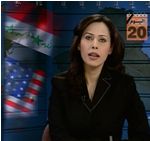 Control Room
Control Room
Directed by Jehane Noujaim
Running Time: 84 minutes
With each war, the media's role has evolved, expanded and been redefined. The recent war in Iraq was a media spectacle, unlike any previous war including the Gulf war in 1991. Control Room examines the media's role in the Iraqi War and questions the media's and government's responsibility when it comes to objectivity, journalistic integrity and of course, spin.
Control Room focuses on two locations. Central Command (abbreviated Centcom) is the media center for all communications in Iraq during the war. The big media players, such as BBC, CNN, ABC, even Al-Jazeera all have offices there. There are also American press liasons, many of whom conduct press conferences and interviews with the media outlets. The other location is Al-Jazeera itself, the largest Arab news outlet. Al-Jazeera becomes the primary focus of the film from both locations, and many of the interviews come from Al-Jazeera reporters..
Control Room is a bold documentary. Some have accused it of being slanted, perhaps rightfully so. Others have called it anti-American, which I think is a bit too strong, but I can see how some might think that. Many of those who were working for Al-Jazeera were Iraq natives. It's only natural that they would not agree with American policy in the region, and they are critical of the administration at several points in the film. But don't expect a relentless Bush attack. They do present American counter-arguments on most key points, in the form of Lieutenant John Rushing, whom I will discuss in more detail shortly.
Control Room says a great deal about media media bias, and most of its points are accusatory. Networks such as FoxNews are singled out, but all American, Arab and other country's networks are accused of pandering to nationalism, which in effect causes them to distort the truth. The film paints a slightly different picture of Al-Jazeera, which I consider one of the film's flaws. Just going by the arguments presented in the film, Al-Jazeera is going to present biased images, regardless of their intent.
I found Press Agent Rushing to be the most balanced figure in the film. Sure, he did paint an inaccurate picture of certain events to the press, and often his rhetoric was flawed, but he was at least reasonable. There were a few poignant scenes of his where he speaks with an open mind, some of which where he really questioned his and America's role in the region. In one of these scenes, he compares two nights where he had watched the Al-Jazeera network. On the first night, he saw graphic images of dead Iraqi citizens. He was startled by the images, and surprised the network would show such gore, but he was able to go on about his evening relatively undisturbed. The following evening he was watching the network again and this time saw graphic images of dead American soldiers. This time he was affected more drastically. The previous night was still fresh in his memory and he did connect the events, thus he was able to identify with most Iraqi citizens. He realized that how he felt on the second night was probably how they felt seeing the images of the first night, which in this war happened to be the type of images shown every night..
Keeping in the tradition of recent political documentaries, Control Room has plenty of humor, however most of comes from Rumsfeld and Bush making comments during the war. Many of those comments were either questioning the objectivity and agenda of Al-Jazeera, while others were downright accusing them of airing propaganda. The comments are humorous because we have the benefit of hindsight. While Al-Jazeera was likely guilty of tainting their coverage, they were not the only ones. We've learned since that the White House fed a lot of misinformation to the media, so Rumsfeld's comments today are colored with irony and hypocrisy. Now don't get me wrong. The directors don't spend all their time "bashing" the Bush administration, but instead they shed light on a different perspective, one that is often humorous.
We're lucky that a documentary crew had the foresight to plant themselves at media headquarters during the war. It's easy to get carried away in the fast paced media coverage of the war, that you might not question its authenticity. Control Room provides a riveting picture of the media operation during the war, plus it also questions the media's role during the war, as well as journalistic ethics and integrity when it comes to televised media.
Score: 7/10